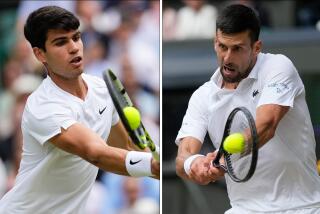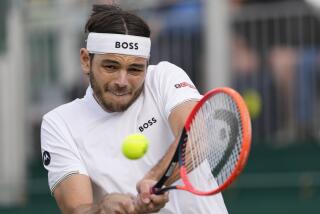The Face in the Mirror Doesn’t Smile Back
- Share via
WIMBLEDON, England — They could have played “mirror, mirror on the wall. . .” before they played tennis. It was the right place, the right time. Wimbledon’s defending champion and the world’s No. 1-ranked player were, theoretically, about to find out who was the fairest of them all.
Boxers or baseball players are rarely put in the same dressing room, but people in this racket are not so lucky. Boris Becker and Ivan Lendl had to groom themselves for their Wimbledon date Sunday in the same space. They did not speak. They did not make eye contact. But long mirrors lined the opposite ends of the room, and each man stole glances, trying to spot something--fear, anxiety, overconfidence, anything--in the other’s reflection.
“Wir haben uns nicht angeschaut,” Becker said later, in his native tongue.
Meaning: “We never looked at each other.”
When they strode side by side into the quaint Centre Court bullring at 2 p.m., they did not exchange idle chit-chat, as Martina Navratilova and Hana Mandlikova had the day before. They took to their chairs, unzipped their jackets and unzipped their rackets. Becker re-tied his size-12 shoes. Lendl re-checked his pocketful of resin.
There were no glances, not even sideways. No handshake. No “good luck.” Not even “go to your corners, and may the better man win.” It was not a matter of animosity. Just determination.
And so, at 2:09, after five minutes of warmup, they went to work: A husky 18-year-old from West Germany, and a lean and hungry Czech of 26. Arguably, they were the two greatest tennis players on Earth. There was a fellow from Sweden, Mats Wilander, who was seeded No. 2 and was occupied at this precise moment winning the Wimbledon doubles. And there was a fellow back in Malibu, name of John McEnroe, who might not have bronzed his racket as yet. Otherwise, these guys were it.
It was evident from their first shots that their games were fine-tuned. No sooner had Wing Commander George H. Grime, the umpire, issued his first command, “Ready, play,” than did Becker blast an ace to Lendl’s right, a serve so fast that a constable’s radar could never have detected it.
Gunther Bosch, Becker’s coach, crossed his heart and swore that his protege’s serve throughout the tournament had been clocked at 250 kilometers per hour, which, if an American’s calculations are correct, would translate to around 156 m.p.h. If true, Becker’s service would make Roscoe Tanner’s, in comparison, seem like a 98-pound weakling’s. “Boom Boom” himself, while winning Wimbledon last year, served no faster than 130.
His first serve Sunday would be the first of 15 aces for Becker, or six fewer than he chalked up in the 1985 championship final with Kevin Curren. Lendl did what he could with it. The hardship, Lendl said, was not Becker’s speed. It was his confidence on grass. On faster surfaces, Boom Boom went for the bomb on his first serve, then, if he missed, simply put the ball in play with some English on his second.
“He doesn’t take as many chances on other surfaces on his second serve,” Lendl said. “He takes chances here. He goes for them. He knows that if he double faults, it does not really matter that much, because he is going to have two more big ones coming up.”
Lendl’s own service is hardly from badminton. One would never know that, though, from watching Becker cope with it. What he does on Lendl’s second serve, Lendl can not do back. “He stands inside the baseline and just swings,” Lendl said, likening it to a baseball hitter aiming for the fences. “I would love to do the same on his serve, but I can’t, the way he is serving at the moment. I know that every time I miss the first serve, he is just going to take a crack at it.”
The two men played on, warring at the 100th Wimbledon. Becker broke service to take the first set, 6-4. He began the second set dealing ace, ace, ace. He ended this set with a love game: A wicked forehand volley winner, an ace, a perfect drop shot, and ultimately a bullet serve that Lendl could return only feebly. Set to Boom Boom, 6-3.
If Lendl were reeling, Becker could not yet see it in his eye. But by now he was looking. He was looking for a roll of the eyeballs, a shutting of the lids, a glassy stare, a wince, any sign that the Czech at last had seen, if not a spectre in the mirror, than at least the writing on the wall.
It came in the third and final set. Lendl looked as though he was about to win one, leading 4-1, but soon came a service break, Becker again taking a vicious swipe at a Lendl serve and hitting a backhand for a winner that made it 4-3.
It became 4-4, then 5-4, Lendl. And the set could have been his. He took the first three points of Becker’s service, each with exquisite shots. Triple-break point. Triple-set point.
Becker served, volleyed, hit a backhand for a winner. Served, volleyed, hit a forehand for a winner. Served, volleyed, hit a backhand for a winner. Deuce.
“And then I saw a little bit in Ivan’s face that he did not know what to do any more to pass me on the big points,” Becker said.
If Lendl had looked in a mirror just then, he would have felt like Count Dracula. There would have been no reflection. He was not there any more.
Becker served an ace. Becker served a bomb. The match was 5-5. Becker broke Lendl’s service. The match was 6-5. Becker saved a point while sprawled on the ground. Becker served two more bombs. The match was his.
There was a ceremony on Centre Court. Becker met some dignitaries. Becker embraced his award. Becker waved to his admirers. Lendl came out and did likewise, and the two men clasped palms, or fingers, lightly and briefly, the sort of handshake business executives used to mock and mistrust.
Becker had more posing to do, more people to meet. Customarily, the runner-up would stand to the side and observe. But Lendl had seen enough of Becker for one day. He asked permission to leave, and the two players therefore did not exit the championship court together, as historically did the finalists of 99 Wimbledons before.
The mirror could have foretold this destiny:
The winner to be young and fair, to be Snow White, to be enjoying himself among friends. Boris to be that man.
And the loser to be sad and reserved, to be Greta Garbo, to go off by himself. Ivan to be alone.
More to Read
Go beyond the scoreboard
Get the latest on L.A.'s teams in the daily Sports Report newsletter.
You may occasionally receive promotional content from the Los Angeles Times.










